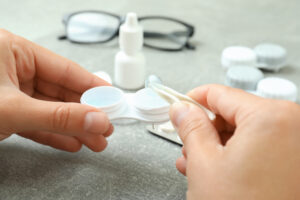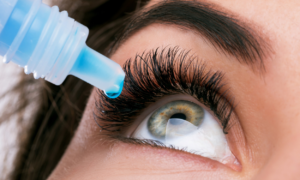Expert Guest Post by Dr. Shibal Bhartiya, Leading Eye Surgeon at Marengo Asia Hospitals, Gurgaon
Recently, TV actress Jasmin Bhasin, shared her story about experiencing excruciating pain and decreased vision due to improper contact lens use. She suffered from corneal damage and had to be rushed to the doctor.
Her experience reminds us of the importance of taking good care of our eyes, especially when using contact lenses. While convenient and effective for vision correction, contact lenses can lead to several complications if not used and maintained properly. These complications can range from mild discomfort to severe eye conditions that may affect vision permanently.

Eye health is often ignored or put up on backburner until and unless it becomes a pressing issue. But instead of taking our eyes for granted, let’s understand some key points related to complications that can arises due to contact lenses and signs of corneal damage you should be on watch out. And let’s also share some important tips on how to keep your eyes health and prevent any damage due to the use of contact lenses.
Complications of Contact Lenses
- Dry Eye Syndrome: Contact lenses can cause dryness, leading to discomfort, redness, and a gritty feeling in the eyes.
- Corneal Hypoxia: Extended wear of contact lenses, especially those with low oxygen permeability, can cause corneal hypoxia. This results from inadequate oxygen supply to the cornea, leading to swelling, discomfort, and potential long-term damage.
- Allergic Reactions: Some users may develop allergic reactions to the contact lens material or cleaning solutions, causing itching, redness, and swelling.
- Infections: Poor hygiene and improper lens care can lead to bacterial, fungal, or amoebic infections, which can be sight-threatening if not treated promptly.
- Conjunctivitis: Also known as pink eye, conjunctivitis can occur from viral, bacterial, or allergic causes and can be worsened by contact lens wear.
- Corneal Ulcers: Open sores on the cornea, often resulting from untreated infections or injuries. Symptoms include severe pain, blurred vision, and light sensitivity.
- Acanthamoeba Keratitis: A rare but serious infection caused by a microorganism found in water. It can lead to severe pain and potential vision loss.
- Mechanical Damage: Improper handling of contact lenses can cause scratches or abrasions on the cornea, leading to pain, light sensitivity, and an increased risk of infection. Bleeding in the eyes, or subconjunctival hemorrhage, is usually painless, but the eyes appear very red.

Symptoms of Corneal Damage
- Foreign Body Sensation: Poorly fitted lenses or trapped debris under the lens can cause a sensation of a foreign body in the eye, leading to discomfort and potential injury.
- Photophobia: Sensitivity to light can occur due to various complications from contact lens wear, including infections and corneal damage.
- Dryness of Eyes: Dry, itchy, and gritty eyes are often due to decreased tear production and underlying inflammation of the conjunctiva.
- Redness of Eyes: All complications of contact lens use can cause redness of the eyes, which can range from a mild “pink” eye to bloodshot eyes due to subconjunctival hemorrhage or bleeding.
- Watering of Eyes: Excessive tearing is also a sign of damage to the eyes. Any pus discharge from the eyes is a sign of acute infection, and you must contact your eye doctor immediately.
Tips to Prevent Damage Due to Contact Lens Use and Keep Your Eyes Healthy
Practice Good Hygiene:
-
- Wash Your Hands: Always wash your hands thoroughly with soap and water before handling your contact lenses. Dry them with a clean, lint-free towel to avoid transferring dirt or bacteria.
- Clean Your Fingernails: Make sure your fingernails are trimmed and clean. Long fingernails can damage both the contact lenses and your eyes.
- Clean Your Lenses: Use the recommended contact lens solution to clean and disinfect your lenses. Avoid using tap water, saliva, or any other liquid not designed for contact lens care.
- Do Not Share Contact Lenses or Eye Makeup/Brushes: Ensure your contact lenses are not touched by anyone else. The same precautions must be followed for any eye makeup, including brushes and applicators.

Follow Your Lens Schedule:
-
- Stick to the Replacement Schedule: Replace your contact lenses as recommended by your eye doctor. Whether they are daily, bi-weekly, or monthly lenses, following the schedule helps prevent the buildup of debris and reduces the risk of infections.
- Don’t Overwear Your Lenses: Even if your lenses feel comfortable, avoid wearing them longer than recommended. Over-wearing can reduce the oxygen supply to your cornea, increasing the risk of complications.
Avoid Sleeping in Contact Lenses:
-
- Remove Before Bed: Unless your lenses are specifically designed for overnight use, remove them before going to sleep. Sleeping in lenses can increase the risk of eye infections and complications.
Handle Lenses with Care:
-
- Be Gentle: Use your fingertips to handle your lenses, avoiding contact with your fingernails, which can scratch or damage them.
- Check for Damage: Before putting in your lenses, inspect them for any tears, scratches, or debris. Damaged lenses can irritate your eyes and lead to abrasions.
Keep Your Contact Lens Case Clean:
-
- Rinse and Dry: Regularly rinse your contact lens case with fresh contact lens solution and let it air dry. Replace your case every three months to reduce the risk of contamination.
- Use Fresh Solution: Always use fresh solution to store your lenses and avoid topping off old solution.
Protect Your Eyes:
-
- Wear Sunglasses: Protect your eyes from harmful UV rays by wearing sunglasses when you’re outside. UV rays can damage your eyes, especially when you’re wearing contact lenses.
- Avoid Swimming with Lenses: Water from pools, lakes, and oceans can introduce harmful microorganisms to your eyes, so it is best to avoid wearing lenses while going for a swim.
Know the Signs of Trouble when it Comes to Eye Care
- Pay Attention to Symptoms: If you notice redness, pain, blurred vision, excessive tearing, or any unusual discomfort, remove your contact lenses immediately and consult your eye doctor.
- Seek Help Promptly: Early intervention can prevent minor issues from becoming serious problems.
By following these simple tips, you can enjoy the convenience and benefits of contact lenses while keeping your eyes healthy and safe. Remember, your eyes are precious, and taking good care of them is essential for maintaining clear vision and overall eye health. If you have any questions or concerns about your contact lenses, don’t hesitate to reach out to your eye doctor.
Also Read: Can Positive Affirmations change your life? Insights from Expert
Also Read: Breaking the silence on Cervical Cancer – Here’s what we women need to know
Meet Our Expert Guest Author: Dr. Shibal Bhartiya is Director (Dept of Ophthalmology), Marengo Asia Hospitals, Gurgaon, and is also the Program Director for Community Outreach and Wellness, at Marengo Asia Hospitals, Gurgaon, and Faridabad. Specializing in Glaucoma, Neuro ophthalmology, and ocular surface diseases, Dr. Shibal boasts an impressive track record with over 20 years of experience in the field of ophthalmology.

